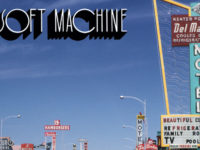Recordings of Soft Machine live shows from the first half of the 70s were numerous with so many having of them been cleaned up and put at as quality official releases. Drop (Moonjune Records) stands out from those in that it’s a snapshot of the Canterbury legends at a very brief, pivotal moment in its history when it seemed the quartet was going to transform into something it ultimately didn’t follow through on.
In need of a drummer after founding member Robert Wyatt had vacated the band in June of 1971, remaining members Mike Ratledge (keyboards), Hugh Hopper (bass) and Elton Dean (saxes), turned to Phil Howard — Dean’s percussionist from his side project Just Us – a couple of months later. The tracks on Drop were taped in November of 1971 while touring West Germany, and at the conclusion of this trip, the group immediately began recording their next album, which would become Fifth.
A cursory look at Drop‘s track listing tips off a new emphasis: all but two of the seven tracks that appeared on Fifth were performed in this assemblage, and none from the last studio release at the time, Fourth, which was heavily represented earlier in the year while Wyatt was behind the kit. Two songs from Third were played, but it would be expected they would pull numbers from their most popular album.
Compared to the Høvikodden 1971 gig from nine months earlier, the alteration displayed on Drop is pretty astonishing considering that only the drummer had been changed out. Howard only drummed and didn’t take over for Wyatt’s occasional vocals, so Soft Machine became strictly an instrumental group from this point forward. Moreover, Howard along with Dean sought to push the Softs into a freer path, one that leaned heavier into improvisation. Ratledge had diplomatically stated at the time that “Phil has a very intense thing going,” but the push into free jazz territory wasn’t really embraced by him nor Hopper, even as they clearly had the chops for that kind of stuff.
Elton Dean’s “Neo Caliban Grides” carried over from the Softs’ Wyatt period setlist and eventually landed on Dean’s solo album Just Us that year. This was a tumultuous set-starter going back to when Wyatt was in the band, and when we heard the February, 1971 version, it was already unhinged by Soft Machine standards. Nine months later, the entire band jumps into the swirling sonic mass at the first part instead of the earlier Ratledge/Dean-only interaction. After the smoke clears is the first sign that the singular band had become two opposing forces: Hopper and Ratledge attempting to maintain some semblance song structure while Howard and Dean being more interested in creating chaos.
The tilt toward chaos proves to be both a blessing and a curse at times: “All White” is given a needed kick in the pants by Howard’s unrelenting cymbal rides, nearly drowning out Ratledge and the soaring Dean, but Hopper’s indefatigable bass figures hold it together. “As If” was penned by Ratledge but it’s Dean and Howard who inject all the life into this brooding song with the saxophonist registering some impassioned wails.
The groove on “Slightly All The Time” (from Third) is more ambiguous in Howard’s hands, who leaves that chore entirely up to Hopper while he goes soloing through the changes. Dean, meanwhile, puts down an excellent saxello solo. The other Third signature track “Out-Bloody-Rageous” is noticeably altered underneath by the divergent drumming; Wyatt would closely track the bass line on snare while Howard’s engagement with Hopper is vague here. Dean does double duty on Fender Rhodes, complementing Ratledge’s own Rhodes patterns.
As this comes from the Phil Howard half of Fifth, Ratledge’s “Drop” doesn’t vary much from the studio version that was to be taped very soon afterwards, and Hopper’s spacey, meditative “M.C” is well-suited for Howard’s untethered approach, though he showed more subtlety on the studio version.
Howard was afforded his own feature with his improvised drum piece “Dark Swing,” and Ratledge’s appealing melody “Pigling Bland” is played with greater abandon than heard previously or hence, primarily due to Howard all but abandoning timekeeping.
The Phil Howard Era of Soft Machine would prove to be short-lived; he was dismissed just two months after these recordings during the middle of Soft Machine putting down tracks for Fifth. John Marshall stepped in to finish the album, which was released in July, 1972 with both drummers appearing on the final product. Alas, the very thing that Drop has going for it — that tension — is the also that very thing that tore the band asunder. By the time Fifth was out, so was Dean, Howard’s lone sympathetic partner in the band.
The lineup somewhat stabilized before the middle of 1973 after an infusion of ex-Nucleus members, and Soft Machine would solider on continuously until 1978 with mixed results. Through all the turmoil, they always had enough juice to put on great live performances and Drop is the one that suggested an interesting new direction for the group had Elton Dean and Phil Howard held sway.
This isn’t the first time these old tapes have been officially offered to the public: originally released in 2009 but since gone out of print, the 2025 version puts it back into circulation with a shiny, new remastered job from guitarist and audio engineer extraordinaire Mark Winfield. Drop is now available on Bandcamp.
*** Soft Machine CDs and vinyl on Amazon ***
- Claudio Scolari Project – ‘Bloom’ (2025) - June 12, 2025
- Denny Zeitlin – ‘With a Song In My Heart: Exploring The Music of Richard Rodgers’ (2025) - June 4, 2025
- Ches Smith Quartet – ‘Clone Row’ (2025) - May 30, 2025




